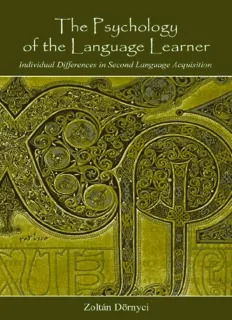
The psychology of the language learner : individual differences in second language acquisition PDF
Preview The psychology of the language learner : individual differences in second language acquisition
THE PSYCHOLOGY OF THE LANGUAGE LEARNER INDIVIDUALDIFFERENCES IN SECONDLANGUAGE ACQUISITION Second Language Acquisition Research Theoretical and Methodological Issues Susan M. Gass, Jacquelyn Schachter, and Alison Mackey, Editors Schachter/Gass Second Language Classroom Research: Issues and Opportunities Birdsong Second Language Acquisition and the Critical Period Hypotheses Ohta Second Language Acquisition Processes in the Classroom: Learning Japanese Major Foreign Accent: Ontogeny and Phylogeny of Second Language Phonology VanPatten Processing Instruction: Theory, Research, and Commentary VanPatten/Williams/ Form-Meaning Connections in Second Rott/Overstreet Language Acquisition Bardovi-Harlig/Hartford Interlanguage Pragmatics: Exploring Institutional Talk Dörnyei The Psychology of the Language Learner: Individual Differences in Second Language Acquisition Monographs on Research Methodology Tarone/Gass/Cohen Research Methodology in Second Language Acquisition Gass/Mackey Stimulation Recall Methodology in Second Language Research Yule Referential Communication Tasks Markee Conversation Analysis Dörnyei Questionnaires in Second Language Research: Construction, Administration, and Processing Of Related Interest Gass Input, Interaction, and the Second Language Learner Gass/Sorace/Selinker Second Language Learning Data Analysis, Second Edition Gass/Selinker Second Language Acquisition: An Introductory Course, Second Edition Mackey/Gass Second Language Research: Methodology and Design THE PSYCHOLOGY OF THE LANGUAGE LEARNER INDIVIDUALDIFFERENCES IN SECONDLANGUAGE ACQUISITION Zoltán Dörnyei University of Nottingham LAWRENCE ERLBAUM ASSOCIATES, PUBLISHERS 2005 MAHWAH, NEW JERSEY LONDON This edition published in the Taylor & Francis e-Library, 2008. “To purchase your own copy of this or any of Taylor & Francis or Routledge’s collection of thousands of eBooks please go to www.eBookstore.tandf.co.uk.” Copyright © 2005 by Lawrence Erlbaum Associates, Inc. Allrightsreserved.Nopartofthisbookmaybereproducedinanyform, byphotostat,microform,retrievalsystem,oranyothermeans,with- out prior written permission of the publisher. Lawrence Erlbaum Associates, Inc., Publishers 10 Industrial Avenue Mahwah, New Jersey 07430 www.erlbaum.com Cover design by Kathryn Houghtaling Lacey CIPinformationforthisvolumecanbeobtainedbycontactingthe Library of Congress Includes bibliographical references and index. ISBN 1-4106-1334-8 Master e-book ISBN ISBN 0-8058-4729-4 (alk. paper) You will go out in joy and be led forth in peace; the mountains and hills will burst into song before you, and all the trees of the field will clap their hands. Instead of the thornbush will grow the pine tree, and instead of briers the myrtle will grow. (Isaiah, 53: 12-13) CONTENTS Preface xi 1 Introduction: Definition, Brief History, and Taxonomy of Individual Differences 1 Definition 4 Brief History of Individual Difference Research 5 Individual Differences in Second Language Studies 6 Taxonomy of Individual Differences and the Structure of this Book 7 2 Personality, Temperament, and Mood 10 Definitions 11 Different Approachest to the Study of Personality 12 Personality and Learning 20 Personality and Language Learning and Use 24 Conclusion 29 3 Language Aptitude 31 Basic Conceptual Issues 32 Language Aptitude Research: From the Beginnings to the 1990s 34 Traditional Issues in Language Aptitude Research 43 New Research Directions and Perspectives 50 Conclusion 63 vii CONTENTS viii 4 Motivation and ‘Self-Motivation’ 65 Three Phases of L2 Motivation Research 66 New Conceptual Issues 88 Reframing L2 Motivation as Part of the Self-System 93 L2 Motivation and SLA Research 109 Educational Implications: Devising Motivational Strategies 111 Conclusion 118 5 Learning Styles and Cognitive Styles 120 What Are Learning Styles? 121 Cognitive Styles 125 Kolb’s Model of Learning Styles 129 Assessing Cognitive and Learning Styles 131 Cognitive and Learning Styles in L2 Studies 136 Practical Implications 155 Conclusion 160 6 Language Learning Strategies and Student Self- Regulation 162 Do Learning Strategies Exist? 163 Learning Strategies in L2 Studies 166 Learning Strategies and Student Self-Regulation in Educational Psychology 188 Conclusion 195 7 Other Learner Characteristics 197 Anxiety 198 Creativity 202 Willingness to Communicate 207 Self-Esteem 211 Learner Beliefs 214 CONTENTS ix 8 Conclusion 218 References 221 Definition Index (Glossary) 253 Author Index 257 Subject Index 264
Description: